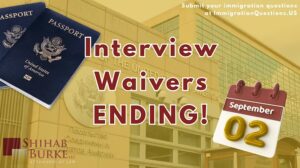By using H-1B visas, many employers based in the United States hire international workers for “specialty occupations” that require highly specialized knowledge. The Immigration and Nationality Act of 1965 defines a “specialty occupation” as work requiring specialized knowledge and a bachelor’s degree – or its equivalent – or a postgraduate degree.

International workers who may qualify for H-1B visas include but are not limited to engineers, programmers, mathematicians, and research scientists in fields such as robotics and biotechnology. The demand for qualified employees in those fields far exceeds the number of available H-1B visas, so when U.S.-based businesses apply for H-1B visas, they need the advice, insights, and services that only an experienced immigration attorney can offer.
High Demand, Fierce Competition
For the employers who need H-1B visas – and for those who want to learn about H-1B visas – the first thing to know is that the competition for these visas is fierce. For more than a decade, the annual cap on H-1B visas has been 65,000, while another 20,000 H-1B visas are set aside for use exclusively by workers with postgraduate degrees earned from U.S. colleges and universities.
Because the demand for H-1B visas surpasses the supply by more than a 3-to-1 ratio, USCIS has now put a “lottery” system in place for the distribution of H-1B visas. In 2015, 233,000 H-1B visa applications were received by USCIS in the first week of April. The deadline for 2016 is looming, so U.S. employers and their immigration attorneys need to begin preparing H-1B visa petitions and gathering the other necessary documents as quickly as possible.
The truth is that H-1B visas are tough – but not impossible – for companies to acquire. U.S.-based employers should engage an experienced Dublin immigration attorney to help your company meet the necessary deadlines, to provide precise and comprehensive information, and to help you avoid the errors, missteps, and confusion that keep too many businesses from obtaining the H-1B visas they genuinely need.
In other words, an experienced immigration attorney can help position you for the approval of your H-1B visa applications, and if your petition is not chosen in the H-1B lottery, your immigration lawyer can help you find other acceptable visa options. With April 1 approaching, employers from anywhere in the U.S. can and should arrange at once to consult with an experienced Ohio immigration lawyer.
H-1B visas are provided only to international employees through sponsoring U.S.-based employers. If all other criteria are satisfied, an H-1B work visa is in effect for three years and may be renewed for a second three-year period. Visa holders are not obligated to remain with their first sponsoring employer for the entire three or six years, so long as a new, qualifying U.S. employer sponsors the worker as an H-1B employee.
Which Companies? Which Workers?
Employers should not make the mistake of thinking that H-1B visas only go to companies like Facebook, Google, and Microsoft. Businesses in all parts of the United States apply for and obtain H-1B visas every year.
H-1B visa holders enrich not only their neighborhoods but also the nation as a whole by helping businesses create more prospects for new jobs, growth, innovation, and prosperity. International workers who are chosen to receive H-1B visas in April will have those visas in hand in October for the beginning of fiscal 2017.
Right now, employers need to determine which international employment candidates are in need of H-1B visa sponsorship. Some job candidates may be working already in the United States with temporary work visas. Workers who may require H-1B sponsorship include:
- Recent international graduates and current international students in Curriculum Practical Training (CPT) or Optional Practical Training (OPT) who will require employer sponsorship when the OPT or CPT expires.
- Those already holding H-1B visas and working for a cap-exempt employer (a college, a university, a non-profit, or a governmental research agency) who seek work with a cap-subject employer.
- Candidates with other nonimmigrant work visas who require a change to H-1B status.
When an H-1B worker leaves a sponsored position or is terminated, the sponsoring business must notify USCIS as quickly as possible to have the H-1B petition canceled, because the business must pay the worker’s wages while the petition remains in effect.
If the employer fires the sponsored employee, the employer must pay for transportation back to the employee’s last place of residence outside of the United States. Sponsoring businesses are not obligated for the return costs for an H-1B employee’s accompanying family members.
About Discrimination
U.S. companies hiring international workers must avoid accusations of discrimination. The advice and insights of a good immigration lawyer can help businesses avoid any discrimination allegations. Employers also face possible liability if they show any discriminatory favoritism regarding pay decisions, layoffs, promotions, benefits, or disciplinary actions.
The Immigration and Nationality Act forbids discrimination by companies with more than four employees, and the 1964 Civil Rights Act outlaws discrimination based on national origin by businesses with fifteen or more employees.
Employers need to be fully prepared with the help of a good Dublin immigration lawyer when they petition USCIS for H-1B visas. Inadequate documentation will lead to the automatic denial of the visa petition. An H-1B application may be rejected if the sponsoring company does not appear to be a legitimate, real, active U.S.-based business with the ability to hire and compensate an H-1B employee.
Employers must present tax returns, financial statements, tax identification numbers, and sometimes more. An H-1B visa petition may also be denied if the employment offered does not meet the definition of a “specialty occupation.”
Petitioning for any visa is an extremely complicated procedure. For H-1B visas, sponsoring employers must provide a precisely-detailed description of the employment being offered and the work location. If the visa application says that the employee will work at a client’s location, USCIS will want to determine if the employee will actually be working for the sponsoring company – or actually for that company’s client.
The sponsor may be asked to produce a contract agreement and/or other evidence that only the sponsor will be the actual employer of an employee working at a client’s job site. Lack of documentation or specificity can result in the quick denial of a visa petition. However, an experienced immigration attorney knows exactly what information and documents will be needed.
H-4 Visas for Dependents
In most cases, international workers approved for H-1B visas may bring their spouses and dependent children to the United States. Provided they meet all other immigration requirements, spouses and dependent children of H-1B visa holders qualify for H-4 visas to accompany an H-1B employee to the U.S.
Since 2015, some H-4 spouses of H-1B visa holders seeking lawful permanent resident status now qualify for work authorization in the United States. Eligible spouses must file Form I-765 (the Application for Employment Authorization) to acquire the Employment Authorization Document (or “EAD,” Form I-766). Upon obtaining an EAD, an H-4 spouse may accept employment in the U.S.
U.S. businesses that employ international workers should know from the start that they must comply with an assortment federal (and sometimes also state and local) immigration and employment laws, rules, and regulations. Several government agencies will have the right to examine your employment files, your job site or sites, and in fact your entire business operation to check on your compliance.
USCIS, the Department of Labor, Immigration and Customs Enforcement (or “ICE”), and the U.S. State Department regularly conduct employer compliance investigations. The government is serious about enforcement, so let an experienced immigration lawyer confirm that your own business is compliant or show you what needs to be changed.
The Help Employers Need
If an employer is cited or investigated for non-compliance, a good immigration attorney can recommend the best legal strategy and the changes necessary to avoid further trouble in the future. If your company is investigated, cited, or currently appealing an unfavorable ruling or finding from a court or a government agency, your company will require the knowledge and services of a savvy and experienced immigration lawyer.
In the United States, no field of law is more complicated or confusing than immigration law. Moreover, immigration regulations and laws are constantly changing and evolving, so employers will want to place their immigration needs and concerns in the hands of an attorney who focuses exclusively on immigration matters. If you own, manage, or do the hiring for a U.S.-based company that hires international workers, you can obtain help right away from an experienced Dublin immigration attorney.
Owners, hiring managers, and international workers themselves can contact an experienced immigration lawyer to have your immigration concerns addressed, your visa questions answered, or to initiate the H-1B visa application procedure.
We encourage you to seek the guidance of the experienced immigration attorneys at Shihab Burke LLC Immigration Lawyers to address any questions you may have about your specific situation.
Contact us today! We are here to help.









